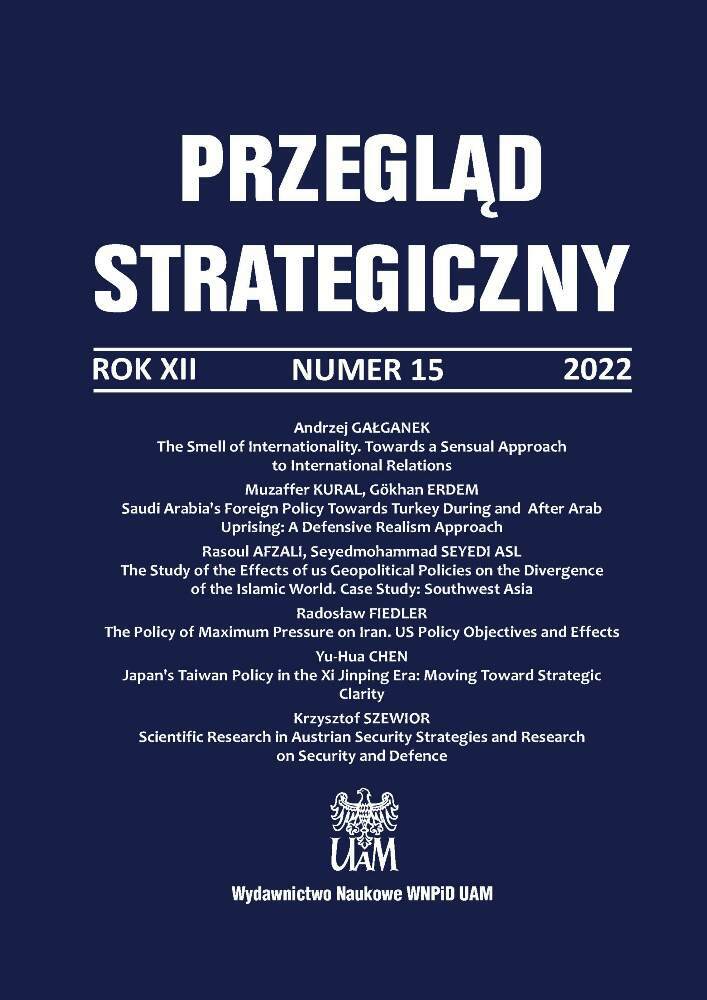Abstract
The purpose of this article is to investigate Iranian-Israeli relations, which are based on hate speech and hybrid warfare, but can actually be reduced to a struggle for power and domination. In order to legitimize their military actions against an enemy state, both Iran and Israel must securitize the threat, which means they must convince the public that the opposing state poses an existential threat. Hate speech and aggressive rhetoric are used by both countries and represent a subjective perception of a threat, as well as a legitimizing tool to justify extraordinary measures to counter the threats. Appealing to fears and threats and the method of creating an enemy are well-known political strategies that ensure the legitimacy of power.
References
Aburish S. (2004), Nasser: the Last Arab, New York.
Ben Meir Y., Bagno-Moldavsky O. (2013), The Voice of the People: Israeli Public Opinion on National Security, “Memorandum”, Vol. 126.
Benhorin Y. (2012), Netanyahu at UN: Red Lines Prevent War, http://www.ynetnews.com/articles/0,7340,L-4286353,00.html (19.12.2021).
Buzan B., Wæver O. (2003), Regions and Powers: The Structure of International Security, Cambridge. https://doi.org/10.1017/CBO9780511491252 DOI: https://doi.org/10.1017/CBO9780511491252
Cohen S. (2008), Israel and Its Army: From Cohesion to Confusion, Oxon.
Cordesman A. H. (2007), Iran, Israel and nuclear war, https://csis-website-prod.s3.amazonaws.com/s3fspublic/legacy_files/files/media/csis/pubs/071119_iran.is%26nuclearwar.pdf.
Dalton M. (2017), How Iran’s hybrid-war tactics help and hurt it, “Bulletin of the Atomic Scientists”, Vol. 73, No. 5. https://doi.org/10.1080/00963402.2017.1362904 DOI: https://doi.org/10.1080/00963402.2017.1362904
Decis H., Le Breton Ch. (2021), A new phase in the Gulf shipping threat?, https://www.iiss.org/blogs/military-balance/2021/09/a-new-phase-in-the-gulf-shipping-threat (10.01.2022).
Fassihi F., Gladstone R., Bergman R. (2021), Blackout Hits Iran Nuclear Site in What Appears to Be Israeli Sabotage, “The New York Times”, https://www.nytimes.com/2021/04/11/world/middleeast/iran-nuclear-natanz.html (23.01.2022).
Goldenberg I., Heras N., Thomas K., Matuschak J. (2020), Countering Iran in the Grey Zone, https://www.jstor.org/stable/resrep24223 (18.01.2022).
Grabowski W. (2020), Application of the Regional Security Complex Theory for Security Analysis in the Persian Gulf, “Athenaeum. Polish Political Science Studies”, Vol. 68(4). https://doi.org/10.15804/athena.2020.68.02 DOI: https://doi.org/10.15804/athena.2020.68.02
Grant G. (2008), Hybrid Wars, “Government Executive”, Vol. 40, No. 5.
Hendrix S., Rubin S. (2021), Israel pushing White House to demand more in Iran nuclear talks but avoiding confrontation with Biden, “The Washington Post”, https://www.washingtonpost.com/world/middle_east/iran-nuclear-deal-israel/2021/12/16/9fcf323c-5c5f-11ec-b1ef-cb78be717f0e_story.html (7.12.2021).
Hoffman F. G. (2007), Conflict in the 21st Century: The rise of Hybrid Wars, Arlington.
Israeli Public Opinion Polls: Attitudes Toward Iran (2013), https://www.jewishvirtuallibrary.org/israeli-attitudes-toward-iran (22.01.2022).
Kaye D., Efron S. (2020), Israel’s Evolving Iran Policy, Israel’s Evolving Iran Policy, “Survival”, Vol. 62, No. 4. https://doi.org/10.1080/00396338.2020.1792095 DOI: https://doi.org/10.1080/00396338.2020.1792095
Leonard S., Kaunert C. (2011), Reconceptualizing the Audience in Securitization Theory, in: Securitization Theory: How Security Problems Emerge and Dissolve, (ed.) T. Balzacq, London–New York.
Lupovici A. (2016), Securitization Climax: Putting the Iranian Nuclear Project at the Top of the Israeli Public Agenda (2009–2012), “Foreign Policy Analysis”, Vol. 12.
Parsi T. (2007), Treacherous Alliance: The secret dealings of Israel, Iran and the United States, New Haven.
Pelletiere S. (1992), The Iran-Iraq War: Chaos in a Vacuum, New York.
Shavit A. (2012) Former Mossad Chief: An Attack on Iran Likely to Foment a Generations-Long War, “Haaretz”, http://www.haaretz.com/weekend/magazine/former-mossad-chief-an-attack-on-iran-likely-to-foment-a-generations-long-war-1.461760 (4.12.2022).
Stephens B. (2019), The Man Who Humbled Qassim Suleimani, https://www.nytimes.com/2019/01/11/opinion/gadieisenkot-israel-iran-syria.html.
Yingst T. (2019), Jared Kushner says successful Mideast peace plan will be ‘Iran’s worst nightmare, https://www.foxnews.com/world/jared-kushner-says-successfulmideast-peace-plan-will-be-irans-worst-nightmare (14.01.2022).
License
Copyright (c) 2022 Wojciech Grabowski

This work is licensed under a Creative Commons Attribution 4.0 International License.

